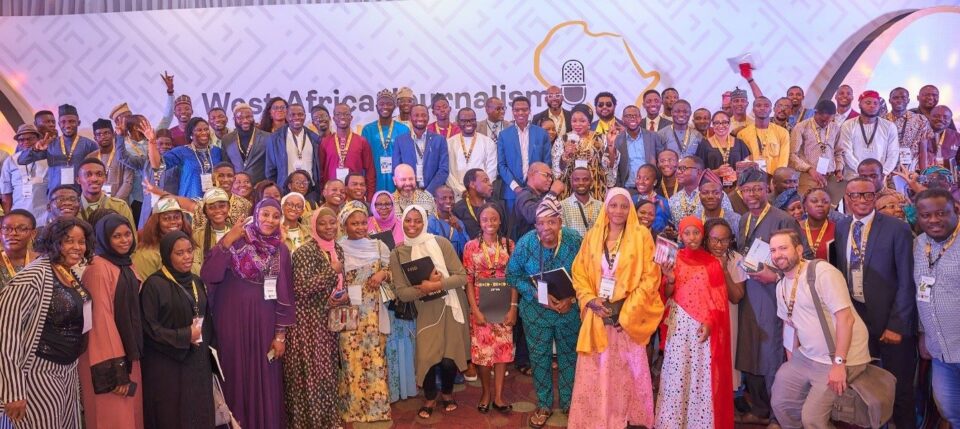PHOTO: West African Journalists in attendance of the WAJIC in Abuja
By George Sarwah-Stewart
Antiquity in Journalism has expired, as journalists and media workers in West Africa gathered to conscientize themselves on the unavoidable usage of technology, artificial intelligence, and most of all, media sustainability. Informed discussions on the state of the media and the compelling need for innovation enabled participants to appreciate the significance of the conference.
Digitalization, innovation, audience-centric media, fact-checking, and sustainability among others were unambiguous terms at the West Africa Journalism Innovation Conference held in the Nigerian Capital, Abuja, on July 24-26, 2023. Over 700 Journalists, media workers, civil society actors, and academicians attended. Though regional, the media conference tapped some of the best from the world. Google News Vice President Richard Gingras delivered the keynote address. And several renowned international organizations partnered with the host institution, the Center for Journalism Innovation and Development (CJID) to make the conference a resounding success.
One of Africa’s media scholars, Nigerian Professor, Media Historian, Prof. Umaru Pate who serves Federal University in Kashere, Gombe State as Vice Chancellor revealed to the media assembly “4Rs” as a strategy for success in Journalism in the world. Prof. Plate named the 4Rs: “Reach out”, “Relevant”, “Reputation”, and “Revenue”.
These four pillars are capable of shouldering the cost of Independent Journalism that seems to bow to partisanship and propaganda even in these crucial Liberian elections of October 10, 2023. I intentionally link up to the struggling Independent Press, because of the flourishing partisan media owned and operated by intolerant politicians. Be not deceived, these politicians do not hate each other; rather they hate Independent Journalism that aims at seeking answers for accountability, fact-checking, and credible reporting.
Attempting to discuss these 4Rs in the interest of the media in Liberia, I hereby bring forth the first, “Reach Out”. The terrain has changed; so media actors and workers must change or go out of business. Today’s business world requires digital media presence, networking, and exposure. Failure is doomed if media practitioners and entities keep their usual frame of mind and exclude themselves from the business world.
Today’s demanding business reality requires media companies not to only have websites but to promote same through electronic mail, sharing on social media varying contents (video, audio, and text) to the taste of their audiences. Traditions are failing; the media in Liberia as an essential part of the democracy of our nation should rise to the changing reality by reaching out. Before I close up on this pillar, may I solicit answers to the following questions meant for managers and media workers in Liberia. Do you have a way of interacting with your audience (viewers, listeners, and readers)? Who are the consumers of your media content? Who could, out of small earnings, support your work with no strings attached? Who are your institutional peers in the West African Region? Who else in the world do you share sisterly relations with? To what extent is your staff benefiting from fellowship, international training, and reporting grants? Reach out!
Professor Pate calls the second R “Relevant”. I suggest this term comes from the background of value. Traditional operations of the media in the world have changed but the functions of the press remain the same. The press remains the mirror through which democracy is viewed as thriving or stagnated. The press should remain relevant to the people no matter how obstructing the powerful of society acts against its function. Remaining relevant to society is a social obligation of the media to the people. Do not lose your relevance!
Reputation: Prof. Plate thinks rightfully that the media and its practitioners must preserve high standards of reputation for integrity. Public space in Liberia is preoccupied with surmountable examples of tainted characters. Even public officials today, do not care about integrity. Interestingly, no one who acts ruthlessly in private and public spaces, members of the Fourth Estate should right society’s wrong by example. Borrowing from the pillar of relevance, reputation is a feeder of trust and reliability. Even technology and Artificial Intelligence, celebrated today, feed in truths, untruths, and half-truths. The personalities, movers, and shakers of the press must be trusted, reliable, and credible.
Revenue: Streams of decent income should by now supplement the traditional “rate sheet” of the media. At this junction, we dare not ignore that the media business needs to be sustained even though the market approach has significantly changed. Good Journalism needs good fundraising and best-practice financial management practice. In this industry, we have to be asking ourselves about our financial management approach. Do we have an operational budget, do we have annual plans filled with activities to raise the revenue? Are there policies to guide our revenues and order our expenditures? It is incumbent on us to function as a conventional business that lives up to its goals and purpose of existence.
In conclusion, I appreciate the organizer of the media innovation conference, the Center for Journalism Innovation and Development (CJID), its sponsors, and eloquent speakers. It is now our turn as participants to live up to expectations. Yes, Journalism has transitioned; so MUST its practitioners the world over including my nation Liberia follow. “Innovate or die”.

